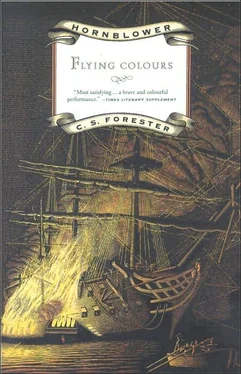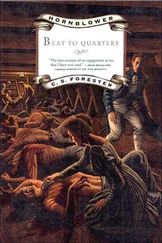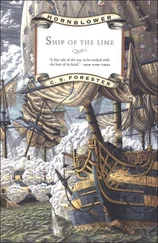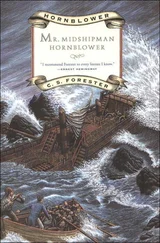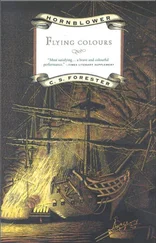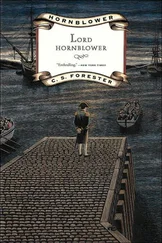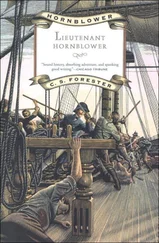Cecil Forester - Flying Colours
Здесь есть возможность читать онлайн «Cecil Forester - Flying Colours» весь текст электронной книги совершенно бесплатно (целиком полную версию без сокращений). В некоторых случаях можно слушать аудио, скачать через торрент в формате fb2 и присутствует краткое содержание. Год выпуска: 1989, ISBN: 1989, Издательство: Back Bay Books, Жанр: Исторические приключения, Путешествия и география, Морские приключения, на английском языке. Описание произведения, (предисловие) а так же отзывы посетителей доступны на портале библиотеки ЛибКат.
- Название:Flying Colours
- Автор:
- Издательство:Back Bay Books
- Жанр:
- Год:1989
- ISBN:0316289396
- Рейтинг книги:5 / 5. Голосов: 1
-
Избранное:Добавить в избранное
- Отзывы:
-
Ваша оценка:
- 100
- 1
- 2
- 3
- 4
- 5
Flying Colours: краткое содержание, описание и аннотация
Предлагаем к чтению аннотацию, описание, краткое содержание или предисловие (зависит от того, что написал сам автор книги «Flying Colours»). Если вы не нашли необходимую информацию о книге — напишите в комментариях, мы постараемся отыскать её.
Flying Colours — читать онлайн бесплатно полную книгу (весь текст) целиком
Ниже представлен текст книги, разбитый по страницам. Система сохранения места последней прочитанной страницы, позволяет с удобством читать онлайн бесплатно книгу «Flying Colours», без необходимости каждый раз заново искать на чём Вы остановились. Поставьте закладку, и сможете в любой момент перейти на страницу, на которой закончили чтение.
Интервал:
Закладка:
He looked along the ramparts at the massive twenty-four-pounders mounted there. The bastions at the angles carried forty-two-pounders—colossal pieces. He leaned over the parapet and looked down; it was a sheer drop from there of twenty-five feet to the bottom of the ditch, and along the bottom of the ditch itself ran a line of stout palisades, which no besieging army could damage until he had sapped right up to the lip of the ditch. No hurried, extemporized attack could carry the citadel of Rosas. A score of sentries paced the ramparts, even as did he; in the opposite face he could see the massive gates with the portcullis down, where a hundred men of the grand guard were always ready to beat back any surprise attack which might elude the vigilance of the twenty sentinels.
Down there, in the body of the place, a company of infantry was being put through its drill—the shrill words of command were clearly audible to him up here. It was Italian which was being spoken; Bonaparte had attempted his conquest of Catalonia mainly with the foreign auxiliaries of his empire, Italians, Neapolitans, Germans, Swiss, Poles. The uniforms of the infantry down there were as ragged as the lines they were forming; the men were in tatters, and even the tatters were not homogeneous—the men wore white or blue or grey or brown according to the resources of the depots which had originally sent them out. They were half starved, poor devils, as well. Of the five or six thousand men based on Rosas the ones he could see were all that could be spared for military duty; the others were all out scouring the countryside for food—Bonaparte never dreamed of trying to feed the men whom he compelled to serve him, just as he only paid them, as an afterthought, a year or two in arrears. It was amazing that his ramshackle Empire had endured so long—that was the clearest proof of the incompetence of the various kingdoms who had pitted their strength against it. Over on the other side of the Peninsula the French Empire was at this very minute putting out all its strength against a man of real ability and an army which knew what discipline was. On the issue of that struggle depended the fate of Europe. Hornblower was convinced that the redcoats with Wellington to lead them would be successful; he would have been just as certain even if Wellington were not his beloved Lady Barbara’s brother.
Then he shrugged his shoulders. Not even Wellington would destroy the French Empire quickly enough to save him from trial and execution. Moreover, the time allowed him for his day’s exercise was over now. The next items in his monotonous programme would be to visit the sick in the casemate, and then the prisoners in the storeroom—by the courtesy of the commandant he was allowed ten minutes for each, before being shut up again in his room, drearily to attempt to re-read the half-dozen books which were all that the garrison of Rosas possessed, or to pace up and down, three steps each way, or to lie huddled on his bed wondering about Maria and the child that was to be born in the New Year, and torturing himself with thoughts of Lady Barbara.
Chapter Two
Hornblower awoke that night with a start, wondering what it was that had awakened him. A moment later he knew, when the sound was repeated. It was the dull thud of a gun fired on the ramparts above his head. He leaped from his bed with his heart pounding, and before his feet touched the floor the whole fortress was in a turmoil. Overhead there were guns firing. Somewhere else, outside the body of the fortress, there were hundreds of guns firing; through the barred windows of his room came a faint flickering as the flashes were reflected down from the sky. Immediately outside his door drums were beating and bugles were pealing as the garrison was called to arms—the courtyard was full of the sounds of nailed boots clashing on the cobbles.
That tremendous pulsation of artillery which he could hear could mean only one thing. The fleet must have come gliding into the bay in the darkness, and now he could hear the rolling of its broadsides as it battered the anchored ships. There was a great naval battle in progress within half a mile of him, and he could see nothing of it. It was utterly maddening. He tried to light his candle, but his trembling fingers could do nothing with his flint and steel. He dashed the tinder-box to the floor, and, fumbling in the darkness, he dragged on his coat and trousers and shoes and then beat upon the door madly with his fists. The sentry outside was Italian, he knew, and he spoke no Italian—only fluent Spanish and bad French.
“Officier! Officier!” he shouted, and then he heard the sentry call for the sergeant of the guard, and the measured step of the sergeant as he came up. The clatter of the garrison’s falling in under arms had already died away.
“What do you want?” asked the sergeant’s voice—at least so Hornblower fancied, for he could not understand what was said.
“Officier! Officier!” roared Hornblower, beating still on the heavy door. The artillery was still rolling terrifically outside. Hornblower went on pounding on the door even until he heard the key in the lock. The door swung open and he blinked at the light of a torch which shone into his eyes. A young subaltern in a neat white uniform stood there between the sergeant and the sentry.
“Qu’est-ce-que monsieur désire?” he asked—he at least understood French, even if he spoke it badly. Hornblower fumbled to express himself in an unfamiliar tongue.
“I want to see!” he stammered. “I want to see the battle! Let me go on to the walls.”
The young officer shook his head reluctantly; like the other officers of the garrison, he felt a kindly feeling towards the English captain who—so rumour said—was so shortly to be conducted to Paris and shot.
“It is forbidden,” he said.
“I will not escape,” said Hornblower; desperate excitement was loosening his tongue now. “Word of honour—I swear it! Come with me, but let me see! I want to see!”
The officer hesitated.
“I cannot leave my post here,” he said.
“Then let me go alone. I swear I will stay on the walls. I will not try to escape.”
“Word of honour?” asked the subaltern.
“Word of honour. Thank you, sir.”
The subaltern stood aside, and Hornblower dashed out of his room, down the short corridor to the courtyard, and up the ramp which led to the seaward bastion. As he reached it, the forty-two-pounder mounted there went off with a deafening roar, and the long tongue of orange flame nearly blinded him. In the darkness the bitter powder smoke engulfed him. Nobody in the groups bending over the guns noticed him, and he ran down the steep staircase to the curtain wall, where, away from the guns, he could see without being blinded.
Rosas Bay was all a-sparkle with gun flashes. Then, five times in regular succession, came the brilliant red glow of a broadside, and each glow lit up a stately ship gliding in rigid line ahead past the anchored French ships. The Pluto was there; Hornblower saw her three decks, her ensign at the peak, her admiral’s flag at the mizzen, her topsails set and her other canvas furled. Leighton would be there, walking his quarterdeck—thinking of Barbara, perhaps. And that next astern was the Caligula. Bolton would be stumping about her deck revelling in the crash of her broadsides. She was firing rapidly and well—Bolton was a good captain, although a badly educated man. The words ‘Oderint dum metuant’—the Caesar Caligula’s maxim—picked out in letters of gold across the Caligula’s stern had meant nothing to Bolton until Hornblower translated and explained them to him. At this very moment, perhaps, those letters were being defaced and battered by the French shot.
Читать дальшеИнтервал:
Закладка:
Похожие книги на «Flying Colours»
Представляем Вашему вниманию похожие книги на «Flying Colours» списком для выбора. Мы отобрали схожую по названию и смыслу литературу в надежде предоставить читателям больше вариантов отыскать новые, интересные, ещё непрочитанные произведения.
Обсуждение, отзывы о книге «Flying Colours» и просто собственные мнения читателей. Оставьте ваши комментарии, напишите, что Вы думаете о произведении, его смысле или главных героях. Укажите что конкретно понравилось, а что нет, и почему Вы так считаете.
